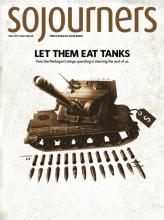As Lent began, the U.S. was in a major struggle over the federal budget. The House majority, under the guise of deficit reduction, proposed a budget that aggressively singled out programs for hungry and poor people, radically scaling them back and capping them to prevent their expansion. Rep. Paul Ryan (R-Wis.), the lead budget-cutter, claimed that the safety net has become a "hammock." We were moving from neglecting the poor to targeting the poor -- an assault against the very people that God specifically instructs us to protect and whose well-being is the biblical test of a nation’s righteousness.
I was feeling a nudge to fast and pray about this, to turn to God for wisdom and direction. As I talked to other leaders, I found I was not the only one. Former Ambassador Tony Hall, of the Alliance to End Hunger, called to say that fasting and prayer was also on his heart. In 1993, as a member of Congress, he fasted for 22 days in response to similar cuts. David Beckmann at Bread for the World, with his deep concern for hungry people, was feeling the same thing. We decided to follow the model, found in the book of Esther, of public fasting, praying, and petitioning political powers to change unjust actions.
On March 28, the three of us were joined by Ritu Sharma of Women Thrive Worldwide at a news conference to announce that the budget debate was a moral crisis, and that prayer, fasting, and radical action were required. We began a Hunger Fast for a Moral Budget.
Read the Full Article
